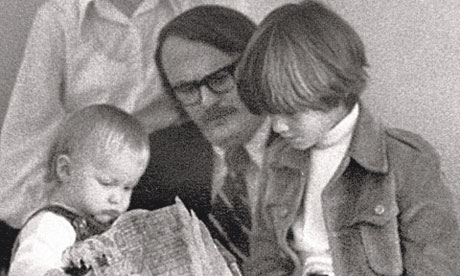
This comes from John Jeremiah Sullivan’s first book, Blood Horses: Notes of a Sportswriter’s Son. In it he chronicles, among many things, the archaeological and cultural story of the race horse, in tangent with his own relationship with his late father, the sportswriter Mike Sullivan. This particular segment details his father’s early ambition to be a literary giant, a person of great sway, and when and why it fell down, all the way down to sports writing–something Sullivan had always seen as a kind of sad destination for his very literary, very talented father.
In 1971 he was still in his mid-twenties, divorced with two children. He had hair down his back and a bushy, dark red mustache, always with the thick glasses. During some pause in the midst of all the frolicking–I have been unable to pinpoint the date–he had begun to write for the Courier-Journal & Times. He did a freelance piece for them, on spec, about a witch who lived near Bardstown… An editor called him in and said, “What can you write about?” There were two things he could have said: beautiful language and sports. He said the one he thought would get him hired, and it decided his career for the next thirty years.
It was around then, I think, that my father relinquished his literary ambition. He told me the story of the moment he made up his mind, without mentioning when it had been. We were in Columbus when he told me, so I was in high school. I had just confessed to having looked at his papers. He kept all of his amateur writing stuffed away in a bunch of leather satchels that Churchill Downs gives to the sportswriters every year before the Derby. One night I gave in to curiosity and spread the contents of one of them out on the floor. I had the nerve to tell him about it later only because I had found, in my snooping, that his poetry was actually pretty good…one did not have to search sympathetically to find the talent in it. A description of a bicycle wheel “unzipping puddles” comes to mind…Certainly it was better than some of the stuff we had heard from behind at the the Thurber House in Columbus, where we sometimes sat through poetry readings together, and I probably told him that I thought so. Sons often wander like sleepwalkers into their fathers’ defeats.
He told me that at one point when he was in his twenties–1971 or 72, I assume–he was beating his head against a short story. It had been stuck in his typewriter for a month, never allowing itself to be pushed beyond the second page. “It was some Faulknerian thing,” he said. “I was devouring Faulkner–everything he wrote, every word.” One morning he woke up and pulled Portrait of the Artist as a Young Man down from the shelf. He started to read. He read for hours, without looking up. “And then I came to a certain page, and I put down the book, and I thought, I will never, ever, ever be able to do that. And I was insane with jealousy. For weeks, just eaten up. I couldn’t read anything. Everything I read, I got jealous. That was when I know that I just had to let it go.”
I said, “But wasn’t Joyce, like, the best? Ever?” (I think I had read “Araby” by then, in a textbook.) “I mean, if everybody who couldn’t write like James Joyce…”
“Yea, I know,” he said, “but I just couldn’t…” And he let it drop. He saw that it was not something I would understand. I was still at the age where I thought my doggerel was as good as Joyce, because of the world-altering fact that it had come out of my brain. My father had gotten past that. He had looked at himself in the mirror and said, “I will never be what I thought I was.” In that moment–the moment of his telling me about it–he became so much less sad in my eyes.
…The decision freed him up to be a fanatical reader, and that is how I like to picture him, to hold him in my memory. We are at the beach in northern Michigan, where we used to spend a few weeks every summer. He has just come out of the lake, where his strange, hard-kicking style sent up little explosions of of water as he moved along parallel to the shore. Now he is in a lawn chair, feet bouncing, cigarette dangling, clip-on shades, the mustache. A can of Tab is resting on the shelf of his belly. His skin, still unscarred, is turning alarmingly red. He has the glow of the health he was born to enjoy. And the paperback is propped against his chest. Every so often, without warning he throws his head back in amazement and exclaims, “Jesus!” Then he says, “Listen to this…”

COMMENTS
4 responses to “Bicycle Wheels Unzipping Puddles: John Jeremiah Sullivan on the Death of the Dream”
Leave a Reply














JJ Sullivan’s Blood Horses is one of my favorite books. Thanks for discussing it, Ethan!
I first read “Blood Horses” because while researching a novel that involved horse racing (“The Stars Shine Bright”). But I quickly fell in love with Sullivan’s writing, and his way of revealing his dad with both an honest and merciful light. Difficult to do, impossible without love and grace.
Syntax errors. Editor needed. And more grace.
[…] the same camp as nonfiction virtuoso John Jeremiah Sullivan, Jamison’s collection of essays take the theme to its furthest reaches. The title comes from her […]